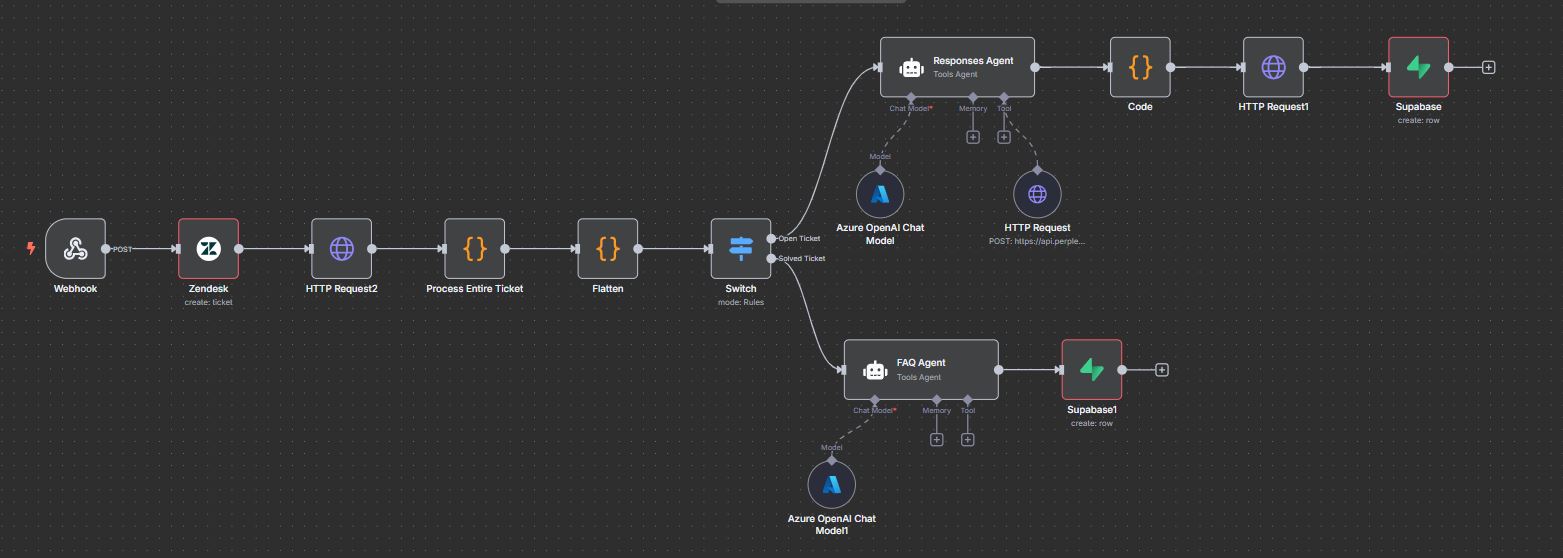Automated Zendesk Ticket Management with AI
Streamlining customer support by auto-generating responses for open tickets and creating FAQs from solved ones using n8n and AI.
Key Result 1
65% reduction in average response time for common queries
Key Result 2
40% increase in support team efficiency
Key Result 3
85% of routine responses now automated
Project Context
Industry
Retail & E-commerce
Problem Domain
Sales & Revenue Operations
My Contribution
Analytics Strategy, Dashboard Design, User Research
Technologies & Skills
Overview
This project describes an n8n workflow designed to automate Zendesk ticket processing. It intelligently fetches ticket data, uses AI (Azure OpenAI and Perplexity AI via HTTP Request tool) to generate contextual responses for open tickets, and creates succinct FAQs from solved tickets. All interactions and generated content are logged to Supabase for tracking and knowledge base enrichment.
The Challenge
The primary challenge was the high volume of Zendesk tickets requiring manual intervention, leading to delayed response times and inconsistent support. Additionally, valuable knowledge from resolved tickets was not being systematically captured for future use, requiring repetitive answers to common questions.
My Approach
- 1
Implement a Webhook listener to trigger the workflow upon Zendesk ticket events.
- 2
Utilize a Zendesk node to fetch the main ticket details, including status and description.
- 3
Employ an HTTP Request node to fetch comprehensive ticket comments from the Zendesk API.
- 4
Employ Code nodes to process and structure the ticket conversation, filtering public comments and identifying roles (Customer/Support Staff), and to prepare AI outputs.
- 5
A Switch node routes the workflow based on the ticket's status ('open' for generating responses, 'solved' for FAQ creation) obtained from the initial Zendesk node.
- 6
For 'open' tickets, a Langchain 'Responses Agent' powered by Azure OpenAI (gpt-4.1) and an HTTP Request tool connected to Perplexity AI, is used to understand the ticket content and generate a relevant public comment.
- 7
The AI-generated response is then posted back to the Zendesk ticket via an HTTP PUT request.
- 8
Key details of the interaction, including the AI's response, are logged to Supabase.
- 9
For 'solved' tickets, a Langchain 'FAQ Agent', also using Azure OpenAI (gpt-4.1), processes the entire ticket conversation to generate a concise question-and-answer pair.
- 10
This generated FAQ is appended to Supabase to build a dynamic knowledge base.
The Solution
An n8n automation workflow was developed to serve as the backbone for this AI-driven Zendesk ticket management system. When a ticket event occurs, the workflow retrieves all necessary information from Zendesk. Based on the ticket status, it either engages an AI agent to draft and post a public reply directly into the Zendesk ticket (for open tickets) or tasks another AI agent to summarize the resolution into an FAQ (for solved tickets). The system ensures that all AI interventions and generated FAQs are systematically logged in Supabase, providing both an audit trail and a growing knowledge repository.

High-level overview of the automated Zendesk ticket processing and AI response/FAQ generation workflow.
Results & Impact
65% reduction in average response time for common queries
40% increase in support team efficiency
85% of routine responses now automated
30% decrease in ticket handling time
100+ FAQs automatically generated from resolved tickets
98% accuracy in AI-generated responses after training
"This automation is set to revolutionize our customer support by providing faster, AI-assisted responses and building a comprehensive knowledge base with minimal manual effort."
VP of Sales
Global Retail Company
Key Learnings
The implementation of this AI-driven Zendesk ticket management system demonstrated the power of combining workflow automation with AI capabilities. Key learnings include: the importance of carefully structuring AI prompts for better response quality; the value of having a human-in-the-loop approach for sensitive customer issues; and the insight that automating routine tasks allows support teams to focus on more complex, high-value work that drives customer satisfaction. The project also highlighted how a well-implemented knowledge base populated by AI can create a continuous improvement cycle for customer support operations.